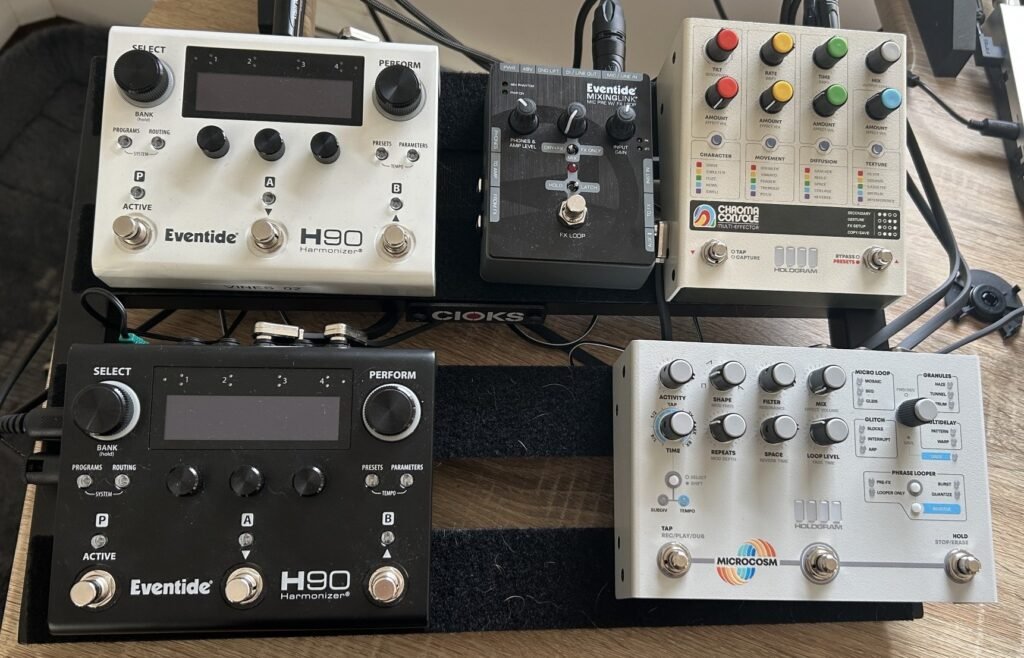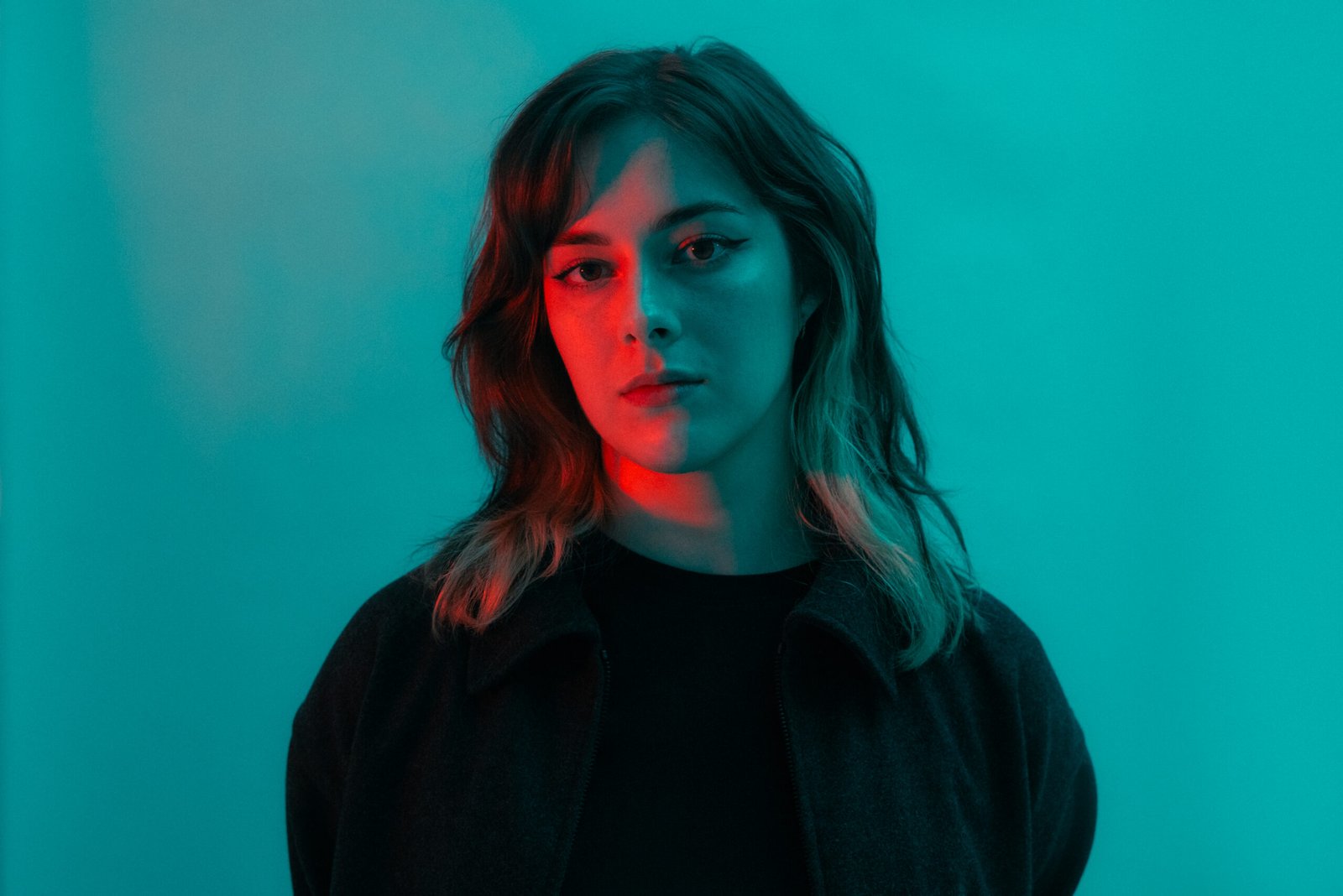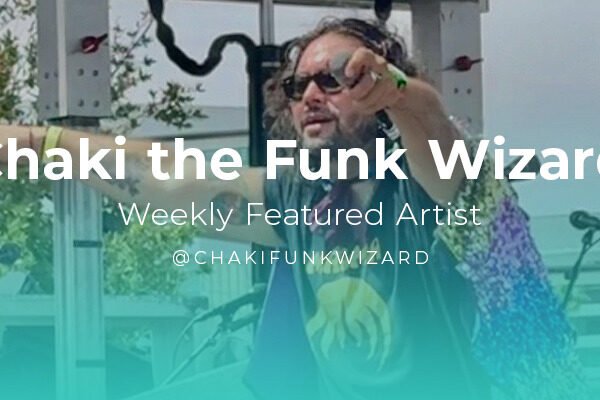If you frequent Everything Is Noise, you’ll likely recall an unnecessarily lengthy album review published recently for an artist who goes by Vines. Their music is something I was completely enamored with (I still am and always will be), hence I lunged at the opportunity to review the new album the instant its release was announced to the world. While it has been just over a month since the release of said album (I’ll be here), I want to take full advantage of the ‘publicity momentum’ and continue to talk about Vines even more in whatever capacity I can. Thus, featuring them as a Weekly Featured Artist couldn’t be any more fitting, as the world would be better off if everyone had a little Vines in their life (ears).
Vines is the passion project of Cassie Wieland, an independent solo musician operating out of New York. You could say that they are in its ‘infancy’ stage as it is a relatively new project that didn’t start officially releasing music until late 2022, the music itself is anything but infantile (hence why I am beyond excited to follow Vines’ career moving forward). What type of music is Vines you may ask? At its core, you’ll hear mainly ambient/modern classical with electronic, subtle jazz, post rock, and emo flavorings. While I admittedly need to be in the precise mood to listen to ambient in general, their take on this amorphous style of music is executed in such a way that is always easily digestible, and that isn’t without a lack of depth. Cassie underwent rigorous training and relevant industry experience that would effectively lay the groundwork for her independent operation of Vines on top of the stellar music. This musical background she details below:
‘I originally started writing music as a classical composer and got my undergraduate and master’s degrees in composition in Illinois. After that, I moved to New York because I didn’t know what else to do, and I hustled for any job tangentially related to music. I worked as an audio engineer, intern, apprentice, and A2, and did some audio archiving. One of my first steady gigs was as a label assistant for Cantaloupe Music, run by Bang on a Can. They release a lot of experimental classical music; Steve Reich, Brian Eno, and so on. That’s where I learned the ropes of the music business. Eventually, the gig economy became unsustainable, and I needed a regular schedule. I worked at The Orchard, a music distributor, full-time for about three years. About a year ago, I left to return to part-time label work and focus on Vines as my solo project. Vines itself started maybe a few months to a year into my time at The Orchard, when I finally had time to think about what I wanted to do and practice it.’
When it comes to ambient music specifically, I’ve always wondered what types of early life experiences and influences (musical or not) that cause one to gravitate to this style of music and eventually inspire them to compose this type of music themselves, especially since this genre isn’t something that one easily stumbles upon. Cassie sheds some light on her ambient/modern classical awakening that I referred to as a ‘magical moment’:
‘Funny you say ‘magical’, because that’s exactly how I think of it. I didn’t always see myself as a performer or music creator, but I gravitated toward music at a young age and to my parents’ surprise, because they didn’t introduce me to it. I was shy and introverted, which meant I was good at listening and observing. I always felt this emotional pull toward music I loved. It felt like magic. Even before I realized I could create music, my favorite thing in the world was to sit, listen, and be completely immersed. In high school, before I had a phone with internet, I had an iPod with the scroll wheel (those were the days man!), mine was orange or yellow, and I’d listen to jazz, like Charles Mingus, right before bed. I’d get to that moment just before falling asleep where all I focused on was the sound. I tried to recreate that every night because it felt unreal, like the only way I wanted to exist. Some people call it meditation. I call it vibes.’
I then nudge the conversation towards specific musical influences as opposed to early life musical experiences:
‘When I first started studying music, I listened to a lot of classical minimalism; Steve Reich and Philip Glass. I loved the way it played with form and time, where even if the music wasn’t changing much, you were changing as you listened. That’s where my love of subtle repetition came from. I also listened to a lot of indie music. I grew up in central Illinois during the height of Midwest emo, bands like American Football and Their / They’re / There. That’s always stuck with me. I’ve always been an emo girl at heart.’
My first exposure to Vines was through a one-off single titled “being loved isn’t the same as being understood” that came up in my YouTube recommendations earlier this year. Prior to my clicking on that track, I never could’ve foreseen it being the precise ambient song that I have been tirelessly searching for over the past 7 years almost. As such, it hit me like a truck and left me emotionally flattened as if a steam roller had gone back and forth over me multiple times. So naturally, I inquired with Cassie about this track and its inception:
‘It [“being loved…”] started weirdly as a collaboration with Aiden Arata, a writer based in LA who just came out with a book called You Have a New Memory. She’s one of my favorite social creators because she makes these ‘guided meditations’ that aren’t really guided meditations, but they have stock ambient music in the background. I loved her work so much that I DM’d her and asked if I could write background music for her TikTok videos. She said yes, and “being loved…” started as a demo for her. She used it in a video where she said, “being loved isn’t the same as being understood.” I asked if I could use that line and publish a song and she was on board. So, it started as a back-and-forth with another artist, which is usually what excites me about creating art, working with people I vibe with.’
This song in particular blew up on TikTok and thus, on streaming platforms. Being completely out of the loop myself on the TikTok side of things, I asked Cassie about that and if it was something she could’ve ever foreseen:
‘That whole month in which that song took off was crazy. It wasn’t something I did on purpose or could have possibly ever predicted would happen. Honestly, I think a random teenager first made a TikTok with that song, using an easily replicable template. It got super popular in like five days. I think around 700,000 people made a video with that song within a month. Even for TikTok standards, that’s crazy. The template I saw the most was people describing themselves in a photo slideshow. The first photo would be of someone or their life, with text like a humble brag about a good quality of theirs, and the second photo would say, ‘and that pretty much sums me up as a person.’ It was pretty simple, not something I would have made myself, but people really gravitated toward it. Some even used it as a memorial for a loved one, telling a story about that person and saying, ‘that’s the type of person they were.‘ It was really sweet to see people document their lives with the song. Honestly, I didn’t spend a crazy amount of time on the song. I just had the urge to create something, and I finished it in maybe a day or two. I didn’t even intend to put it out at first, so yeah, I’m glad I did.’
I’m glad she did too.
Sandwiched in between the one-off “being loved…” and the debut full length, I’ll be here, was another standalone single titled “I am my home”. These two singles are similar to one another with the airy, ethereal vocalizations drifting in and out of space, acting like a balm for the weary soul. After “I am my home” comes the magnificently serene I’ll be here in its entirety. I was curious about the compositional approach and differences from the full album to the various singles. Here is what Cassie had to say:
‘When I was writing the album, I thought a lot about its shape as a whole. I love listening to records front to back and wanted my work to reflect that. Instrumental tracks became much more natural for me to write. In all honesty, I still feel like a beginner with songwriting because while I have classical experience, I don’t have as much experience using words/lyrics to explain how I feel. Ideas for instrumentals came faster and easier. “Evicted” was maybe the third track I wrote and came earlier than the other lyrical songs. It became an anchor for the record, and the instrumental tracks each felt like branches off that song [“Evicted”]. I knew I needed to fill at least 30 minutes and have some more anchors, so I wrote “King of Swords” and “Tired”, “Tired” being the very last song I wrote for the album. I forced myself to write another song with words because the form demanded it. It felt like following breadcrumbs, or like doing one of those slide puzzles in which the object was slowly revealing its form in the background.’
I referred to my own personal connection with her record, and how I interpret this album to be centered around grief (as the album artwork would imply with her lying next to a cemetery). I asked about what feelings, emotions, experiences she meant to portray in this record and if it was grief-centric as I had interpreted it myself:
‘Conceptually, although there really isn’t much of a deep concept, the whole record is like a collage of journal entries. Writing and recording music is my way of processing feelings, especially conflicting or difficult ones. Although there are some obvious universal themes to it, it is mostly left open for interpretation for anyone needing help processing their own emotions. Creating is an outlet for me. I’ll be here isn’t necessarily about the feelings themselves, but how I sift through and work through them. It might not be audible to everyone, but when I listen back, I remember exactly where I was and hear myself working through those feelings in real time. Usually, I don’t think about what I’m trying to express while writing. I just let whatever needs to come out, out. Then I look back and name it. For example, “Happy is Hard” was me frustrated with how difficult happiness can be, as the title would obviously imply, and how much work it takes on a daily basis. The songs with lyrics are a bit more self-explanatory. “Tired” was about a point where I was working through anxiety in therapy. I knew my anxiety was just thoughts, but I still had the feelings, and I didn’t know what to do with it yet. It felt like a weird infinite loading screen, having the info but no action, and feeling exhausted in general.’
Across these three ‘core’ tracks on the album, along with various others from Vines’ earlier work, I noticed a trend. This trend was that any implementation of vocals was always in tandem with vocoder effects. Given the context of the rest of the music, those effects fit beautifully, adding yet another mournful layer of melancholy to the already gloomy and lavish sonic textures. I mentioned my observation to Cassie and asked about where that came from and about interest/influence of those effects came from:
‘Actually, working with a harmonizing pedal is how the Vines project started. During the pandemic, as a composer without anyone to compose for, I had to figure out how to make music and express myself on my own. I’ve always listened to a lot of Bon Iver, Justin Vernon’s work, and other artists who use vocal harmonizing like Japanese House. One day I googled something like ‘Bon Iver vocoder’ or ‘vocal harmonizing pedal’ and a pedal popped up, so I bought it and started learning covers on it. I figured out how to get MIDI signals into the pedal to control exact pitches and ranges. I basically taught myself to treat the pedal as its own instrument. That pedal is in the closet now, battle-scarred having seen better days, for sure. I recently migrated to the Eventide H90 for vocal harmonizing. Using that, I worked on some vocal algorithms together that just came out a couple days ago, but the original pedal will stay with me for a long time.’

Cassie’s current pedalboard set up, featuring the Eventide H90 harmonizers!
Now that we’re a little ways away from the release of I’ll be here, I asked Cassie to reflect on the album and more importantly, if there was anything she’d want to tell herself if she was able to go back in time even earlier in her blossoming career:
‘I spent a lot of time doubting if I was an artist because I had this preconceived idea of what an artist should ‘feel like’ or ‘look like.’ If I could tell my younger self anything, I’d say that it’s not that deep. An artist is just somebody who makes art. You don’t need permission from anyone to be an artist or share your creations. Obviously, the systems can be crazy and unfair in terms of making money, but I wasted time waiting for someone else to give me answers and affirmation instead of just trying things out for my own self. When I started doing that, everything clicked.’
Imposter syndrome is a hell of a beast to overcome, so let Cassie’s wisdom be a message to you all! It is something that I struggled with myself in my own career and even when it comes to writing here on Everything Is Noise. With time and experience, you’ll start to feel more comfortable and confident in your own ability. You shouldn’t need anyone to give you the hypothetical gold stamp of approval, although it most definitely does help, that I will admit. Just believe in yourself and if creating is what you want to do, then you go ahead and do it and don’t let your worst enemy hold you back; yourself.

Vines is:
Cassie Wieland
Although I didn’t touch too much on the music itself here as I originally told myself that I would do, I felt it more fitting to focus on the ‘behind the scenes’ aspect of Vines. While the somber melodies and soundscapes captured on I’ll be here and all of Vines‘ earlier pieces are rich with so much emotion despite few lyrics, you’re able to get a glimpse into the individual behind the music and this article provides even more transparency. I had the greatest pleasure chatting with Cassie and that conversation deepened my appreciation and enjoyment of her music as a whole. For me, she is one of those special artists that I know will stick with me for the rest of my life and perhaps you might find as much enjoyment in the music as I do; you’ll never know until you try. Give Vines a follow of her socials (Instagram | TikTok | Bandcamp | Website) to stay in the know of all things hauntingly gorgeous.
Photo credit: Bao Ngo






